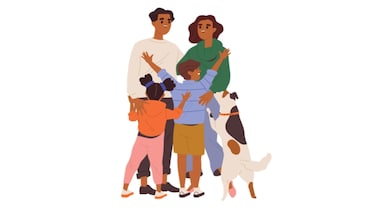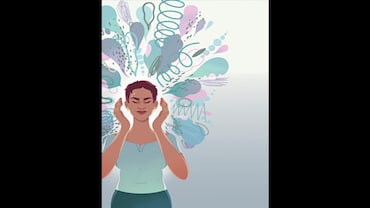- HOME
- /
- Better Living
- /
- Parenting
- /
Parenting In The Time Of The Lockdown
COVID-19, a microscopic behemoth, has brought the world to its knees. Here’s how we can deal with its impact

Sonia loved going to school. Despite her learning difficulties, she was the art teacher’s pet and popular with her friends. Every evening she would return from school happy, struggled with her homework in the afternoon, impatient to go down to play with her friends. Weekends were filled with plenty of fun visits to the park, outings with cousins, going to the cinema or the mall, and time with Papa. Life was full, and despite some distant worries about Sonia’s future, her parents were quite satisfied with the way their pesky ten-year-old was growing up.
Then came the COVID-19 lockdown. At first, Sonia was thrilled to have both parents at home 24x7. But after the novelty of the first few days, Sonia’s mother began to fret about Sonia’s shifting bedtime and overindulgence in junk food. The adults started blaming each other for the lack of discipline. Frayed tempers and shouting matches followed. Restless and cooped up, Sonia became rude and moody with frequent emotional meltdowns about missing her friends and cousins, of wanting desperately to return to school. The fear of contracting the virus, especially by her grandparents, hung like a grey shroud. None of the adults in her life had answers to her questions of why, how and when will things return to normal again.
These are unprecedented times. We are facing a level of crisis that we have never experienced before. The sense of security and safety that we tend to take for granted has been taken away and replaced with unsettling questions of life and death. Besides the imminent threats and trauma it has caused, the disruptions to daily life can have profound effects on mental health, both in the young and old.
For all of us, particularly children, the daily routine and predictability of their surroundings, provides an invisible scaffolding that is essential for security and protection. Daily rituals and weekly engagements may have appeared mundane and repetitive, but they form the platform for emotional safety—a prerequisite for growth, development and effective functioning. Sonia’s mood swings and tantrums, and her parents helplessness in containing her emotions and boundless energy is a reflection of how distressing sudden disruptions can be.
The second fallout has been the institutional breakdowns and consequent lack of structure that has usurped people’s sense of purpose—jobs, going to schools and colleges, fulfilling responsibilities at home and in the community. It causes confusion and makes us, at best, question our belief system, and intense anxiety or utter hopelessness and despair at the severe end. The consequences on mental health could become serious, including anxiety and depression, if this state were to persist, which seems quite likely.
The third damning effect has been limitation of pleasure and recreation activities and the connections that give us joy and lend meaning to our lives—the walk in the park, the family holiday, coffee with a friend, celebrating anniversaries and milestones, going to the cinema, an art gallery, or attending a concert. When these freedoms and choices are taken away, frustration and eventually, feelings of deep loss and grief inevitably follow. It can, indeed, precipitate an existential crisis.
Needless to say, it becomes imperative to prepare for the aftermath and attempt to prevent serious consequences as far as possible. Many organizations working with mental health and associated disciplines are providing online services for the young and the old.
Here are a few strategies that could be useful in these challenging times:
Stem the tide of worry
Information, stories and speculations about COVID-19 is omnipresent, colonizing our minds, dominating our conversations and even invading our dreams if we are not careful. So it is best to compartmentalize it into COVID worry breaks—allot time twice or thrice in a day to do just that; read, watch, research, discuss and worry about it. But only in the designated times and no longer.
Switch up roles
All family members could participate in these deliberations about what is fun and fulfilling for each individual and the family, what could be each ones’ new-found role as a professional, student or homemaker in these circumstances, and what are the responsibilities for each as far as household chores are concerned. Then create a loose structure with each having their own schedule, which is balanced and acceptable.
Reclaim purpose and meaning
This may require brainstorming, both individually and as a collective. Reconnect to the motifs at home that bring back memories and meaning; dig out old photos, remember songs that you would sing together, books that you used to read when the kids where little, holidays that you’ve been for. You could also bring out old board games, make creative spaces with whatever is available at home, cook and eat together, and be as playful as you go through all this. Discussion on similar lines with Sonia’s family helped them to bring back some rhythm and joy in their lives.
Question the given
COVID-19, this microscopic behemoth has made us question our beliefs, scrutinize our institutions and doubt our priorities. There couldn’t have been a better time to take stock of what we have done to our planet, how material pursuits rule our lives, and how polarized we have become as people. Faced with the mass deaths in the world, it is time to question what development is, what constitutes success, and what the larger purpose of life is. It is a time to express gratitude for what we have, and question whether less is indeed more.






